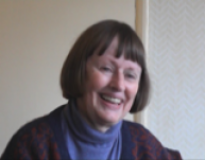Interview 37

Had routine mammograms since her 40s because of family history of breast cancer. In 1997 took part in medical research, including a mammogram. Invasive breast cancer was discovered and had treatment.
A volunteer, married with 3 adult children.
More about me...
She started having mammograms before she was fifty because of a family history of breast cancer.
She started having mammograms before she was fifty because of a family history of breast cancer.
Because of that I was under more regular screening. I was started on mammograms before I reached 50, which locally is the age at which they do it. They were doing them every two years, and that was fine.
A mammogram done in a research project detected a cancer.
A mammogram done in a research project detected a cancer.
Within a week I'd had a needle biopsy, which is a thoroughly unpleasant experience that I wouldn't recommend to anybody, but necessary, and the result of that was that it was a cancerous lump. A very small one, and not palpable by hand, so I really am extremely grateful to that mammogram, because it would have been another few months, possibly six months, before I was due for my next regular mammogram. These things can come so quickly in between.
What happened next? Oh then, of course, you get to the discussion as to what you are going to do, are you going to go for a lumpectomy, followed by, probably chemo or radio, or are you going to go for a complete mastectomy?
Now has mammograms every two years and doesn't feel anxious beforehand.
Now has mammograms every two years and doesn't feel anxious beforehand.
So you go every two years now?
Now, yes, yes.
And before going now, would you still feel a bit anxious?
Not particularly, I don't think. Been there, done that, you know [Laughs]. Lightening doesn't strike twice, I keep telling myself.
Believes that breast screening saved her life, despite scepticism in the medical field about screening.
Believes that breast screening saved her life, despite scepticism in the medical field about screening.
It was a cancerous lump. A very small one, and not palpable by hand, so I really am extremely grateful to that mammogram, because it would have been another few months, possibly six months, before I was due for my next regular mammogram. These things can come so quickly in between.
Because I do feel that someone was looking after me, that sent me for this Ibis trial, just at that time, because had it been another six months before I had a mammogram, had it been six months further on, it could have been out through the nodes. It could be right through the body - well maybe not that fast, unless it was a very aggressive one.
I think it's a splendid, a splendid scheme and no matter what some of those that decry it say, it should be continued. I think it's saved a lot of lives. It certainly saved mine.
She had several benign lumps in the past, some of which were fibroadenomas.
She had several benign lumps in the past, some of which were fibroadenomas.
Well my first problem with my breast came a very long time ago, when I was studying for my A levels, and I discovered a lump in the breast, which was removed just before I went up to university.
You told me right at the beginning that you were only eighteen or nineteen when you had your first lump. You had that removed in hospital?
Yes.
And that was benign. Did they say what it was?
I'm not entirely sure. I think they said fibroadenoma, but I was fairly young, I was not medically informed, and unfortunately my medical records from those days have been destroyed because I was out of the country for more than three years. And you know, you do run the risk of this happening, although I had told them I was going and told them I was coming back. When I came back I had no NHS records, so we do not have a record of what it was. Whether I'd formed the idea that it was a fibroadenoma because of subsequent diagnoses or whether I actually heard that word then, I can't really be certain I'm afraid.
So subsequent lumps were fibroadenomas?
Yes, except the one in the milk duct. That was described as a polyp.
And that was removed surgically?
Yes, oh yes. Yes, they were all surgically removed.
Bleeding from a nipple turned out to be from a benign polyp which she had removed.
Bleeding from a nipple turned out to be from a benign polyp which she had removed.
She spoke to friends who had also had breast cancer.
She spoke to friends who had also had breast cancer.
As I said there was ... it was later that perhaps I used the friends more, because - Although just after the operation there was one particular friend that I used to swap tips with. How do you stop your scar pulling? Try massaging with baby oil, these sorts of tips are useful, because you don't always get those from the health care professionals. They're things that individuals have found work for them.

